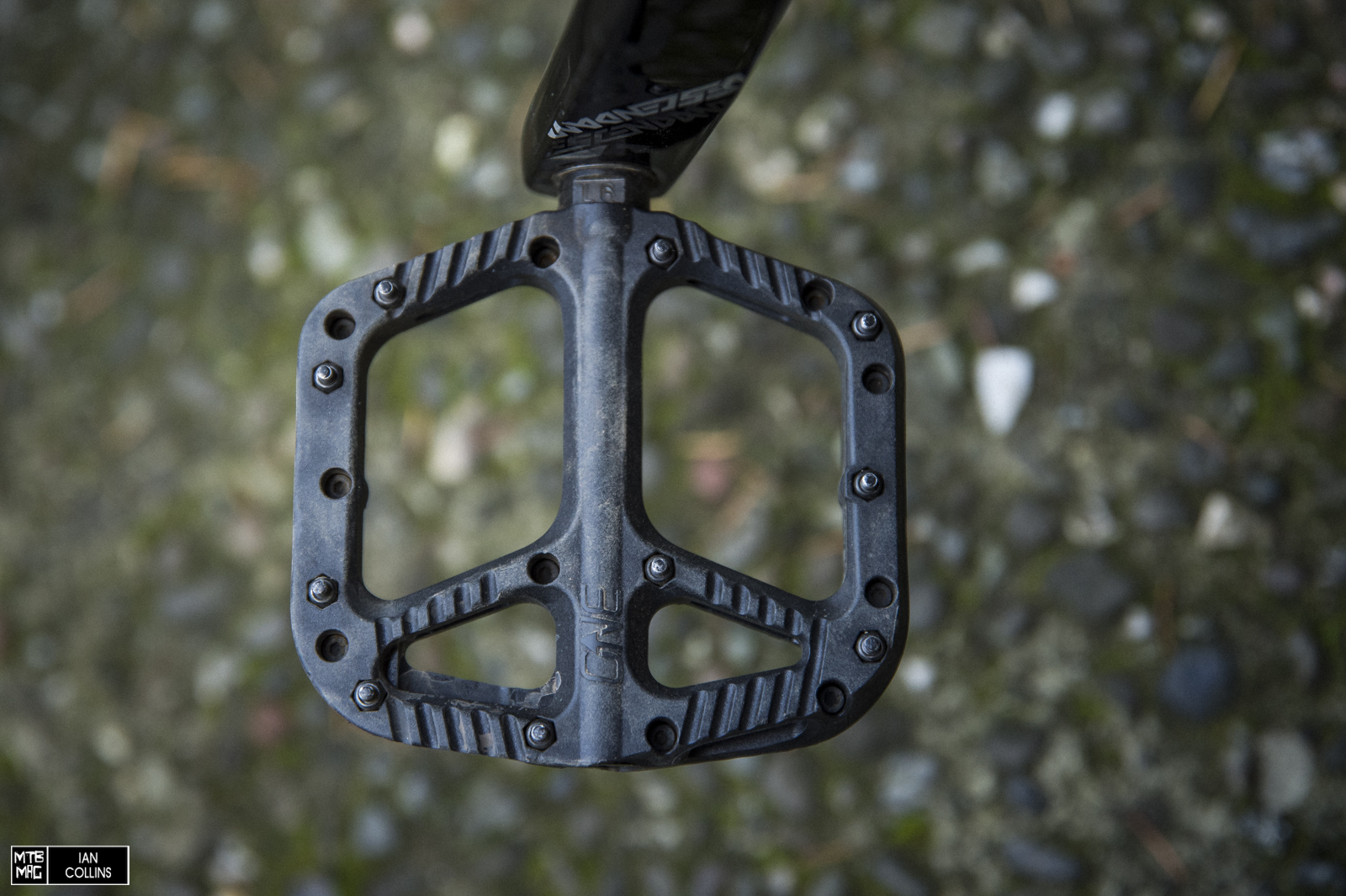[Tested] OneUp Components Composite Pedals
OneUp Components have been making quite a name for themselves lately…The growing Canadian brand started out by making hop-up style wide range 1X drivetrain kits. These days, they’ve been delving into more complicated territories with a comprehensive tool system that fits inside of your headtube and two new flat pedals. As it looked to be quite promising in terms of value, we recently opted to test their $48 (US) Composite flat pedals. At a relatively scant claimed weight of 355 grams (tested at 357 grams) and a broad platform, solid hardware and a fairly thin profile, they looked promising to say the least. Here’s how they’ve held up over the last few months…

Details
• 10 rear loading Steel pins / side, with Nyloc nuts
• DU plus cartridge bearing axle system
• Thin leading edge chamfered design to deflect off obstacles
• Wide platform design for increased stability
• Contoured shape provides ultimate connected feel
• Weight: 355g (tested at 357g)
• Platform Size: 115x105mm
• # of Pins: 10 per side
• Axle Material: Black chromoly steel
• Height: 18.5mm (13.3 at the leading edge)
• Pin to Axle distance: 108mm
• Color: Stealth Black
• Body Material: Nylon Composite
• $48.00 US
First Impressions
The build quality seems above par given the price, but what most would take note of when first looking over a pedal would be shape and pin layout. In the case of the OneUp Composite pedals, it’s quickly apparent that they have a convex shape. Some riders like this and some do not. As you can see in the photo below, the shoes you ride in are a major factor in how a flat pedal will feel based on its shape. Specifically, sole thickness and flexibility are the key aspects.

Aside from shape, the pins are amply tall and the shape makes sense and feels good under your foot in terms of where the material is placed. Anyhow, time to take the smooth feeling bearings, chamfered edges and a surprisingly light weight pedals and see how they did in the real world.

On the Trail
We rode the OneUp Composite pedals in a surprisingly broad array of bikes throughout a variety of scenarios: long trail rides, DH laps, plus some pump track riding and dirt jumping as well. The first day we rode them was with the Specialized 2FO flat pedals shoes on our DH bike…

With this setup, we were initially thrown off…Suffice to say, we started with a brand new pair of Specialized 2FO shoes that had a curved outsole and a really firm sole. Despite having a grippy compound, paired with the OneUp Composite pedals’ convex shape and a stiff sole, they didn’t really mesh well – at least initially. However, once the shoes broke in, the feel improved vastly. Even with that in mind though, we found that generally speaking, the more convex shape of the OneUp Composite pedals paired better with shoes that had softer, more compliant soles.
*We chatted with our contact at OneUp after publishing this review and he made a fair point that we found worth updating the article for: he stated that many flat pedal riders tend to ride with their feet sitting further forward, NOT with the ball of the foot right around the axle, like our tester who tends to go back and forth between flats and clipless.

It’s worth pointing out that plenty of riders so prefer softer shoes paired with a more convex pedal shape. Anyhow, setting aside our nit picking of the slightly convex shape, these pedals performed incredibly well. In terms of support, the shape was flawless, striking a nice balance between providing support where you need it under your forefoot and tapering away around the edges where you need clearance. At 115x105mm the width of the platform was just right; it was easy to find the pedals in panic situations, and they provided loads of support and traction. The pins proved to be relatively tough and the hardware spins on the axle as smoothly as it did on day one despite a few muddy days and high pressure hosings.

Overall
For a mere $48, the value is quite incredible. The OneUp Composite pedals have proven to be tough, surprisingly durable and offer plenty of traction provided you aren’t wearing too firm of a shoe. We see this pedal as being perfect for a no frills rider who’s trying to save a few bucks and keep rocking in his Vans. Overall, two thumbs way up – but if you’re searching for a super concave pedal, keep looking.
The post [Tested] OneUp Components Composite Pedals appeared first on MTB-MAG.COM.
